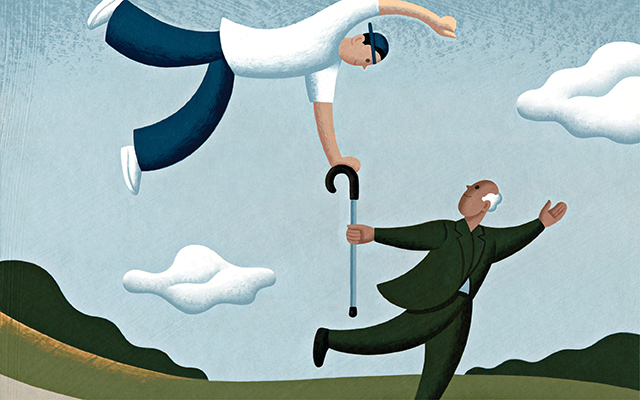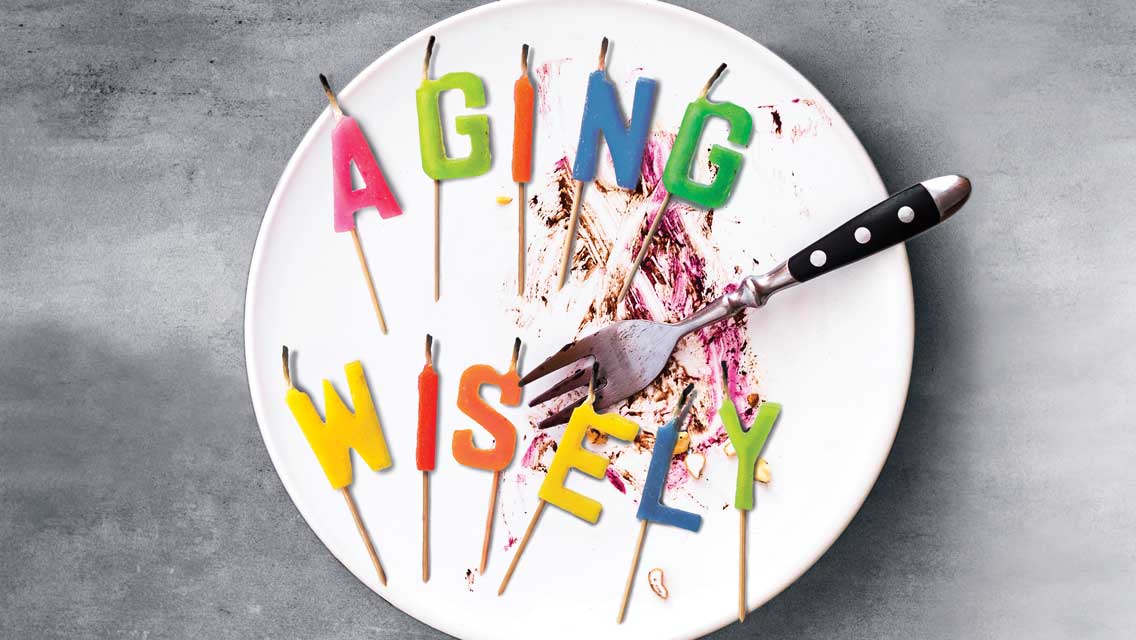The best way to know the heart of another human being, explains Eric Liu in his book Guiding Lights: The People Who Lead Us Toward Our Purpose in Life , is to ask the question: Who influenced you? The answer will likely include the story of a mentor, someone who, often simply through presence and attention, influenced the course of a life.
While the word “mentor” tends to be associated with youth development, academic achievement and career building, mentors can appear at anytime in a person’s life. Whether you’re in your 20s or your 80s, having a mentor, or being one, offers rich rewards (see “Live and Learn,” below). As a mentor or mentee, you’re sure to find inspiration, knowledge and a chance to grow.
Expansion Plan
When Jim Bultman, a corporate buyer in Minneapolis, wanted to volunteer, he asked himself what activity would benefit others – and be fun for him to do on an ongoing basis. The answers he came up with changed his life.
Bultman, then 31, signed up for Big Brothers Big Sisters of America (www.bbbsa.org), the oldest mentoring program for at-risk youth in the United States. He was paired with a 10-year-old Little Brother, and they spent time together nearly every week for several years. “Hanging out with a kid is fun,” Bultman says. “It gives you free license to be goofy and to do all the stuff you secretly like to do but never ask your adult friends to partake in, like bowling on a Sunday morning.”
The benefits, however, reach far beyond fun. According to a 1995 study by the nonprofit organization Public/Private Ventures, the kids who participated in the Big Brothers Big Sisters program were 46 percent less likely to begin using illegal drugs. They skipped 52 percent fewer days of school and 37 percent fewer classes. They’re also more confident in their schoolwork performance and better able to get along with their families.
Numerous studies have also identified how mentoring improves the lives of those who work with youth. It offers people an opportunity to make sense of their own past experiences and challenges, improve their health and self-esteem, increase patience, acquire and develop new skills, and give back to the community.
While Bultman’s mentoring experience was part of a formal arrangement, many are less official – but no less rewarding. Mentoring relationships can evolve gradually and informally when, for example, you reach out to more experienced coworkers for advice or call friends with questions. And, sometimes, the very best teachers reach out to you.
Learning the Ropes
Francisco Ochoa, 43, of San Cristobal, N.M., wasn’t seeking a mentor when one found him. After starting a job at a retail store, another employee offered to show him the ropes. “He was a fatherly figure,” Ochoa says, “and whenever I was learning something new he would gently suggest, ‘Why don’t you try it like this?'”
After several years, Ochoa realized he was being groomed for a supervisory role, which he was eventually offered. “I hadn’t sought the promotion,” Ochoa says, “but I was ready for it because someone had reached out and taught me what he knew.”
Just as significant, Ochoa was able to pick up new skills and knowledge because he had been receptive to feedback. Many people resist learning from another person, but being open to coaching is one of the personal characteristics of successful mentees, according to the Center for 4-H Youth Development at the University of Minnesota. Other characteristics include responsiveness to new ideas, a positive attitude, time availability, flexibility, and a desire for personal growth and development.
Growth Opportunities
In Integrity: The Courage to Meet the Demands of Reality, clinical psychologist Henry Cloud looks at the characteristics of successful people. What they have in common, he writes, is being able to identify “major growth seasons” of their lives that were launched and guided by mentors. Such growth requires openness. “To be mentored means that we allow someone to look at all we are doing, our practices, our ignorance, our lack of ability, and to speak into that,” writes Cloud.
While criticism isn’t always easy to hear, it is often easier hearing it from someone who has your best interests in mind but isn’t a member of your family or close circle of friends. So it’s important to choose your mentors well. Personal characteristics of successful mentors include trustworthiness, commitment, shared decision-making, empathy for others, open communication style and enjoyment of people.
Good mentors are good teachers. In his book Guiding Lights, Liu notes that we are all teachers at heart. “Every day, in every setting and social role we play, we are teaching,” he writes. “Teaching is at the core of our humanity.” We teach to impart facts and skills, says Liu, but we also teach to instill a sense of conscience and to share our sense of meaning. “We teach to articulate for ourselves what on Earth matters,” he writes. “We teach to be sure that we have not lived in vain.”
And above all, he notes, we teach to learn. So whether you decide to find a mentor, to become one, or both, rest assured: This is an exchange where everybody wins.
Live and Learn
Whether you become a mentor or seek mentoring from another, you can be sure the experience will enrich your life – at any age.
LIFE STAGE: YOUTH
Explore the Options. Young people are typically open to learning new things and eager to get better at the things they are already doing. If you’re a kid or young adult looking to master something new, don’t be afraid to ask for mentoring from a person whose skills or knowledge you admire.
And remember, you can be a mentor, too! Look around for someone whom you can mentor on a subject or skill where you excel – teaching can help you develop further and increase your appreciation for how much you already know.
LIFE STAGE: MIDCAREER
Expand the Possibilities. Many businesses now rely on mentoring relationships to expand the skills and confidence of employees who wish to grow in their careers. And those who serve as mentors get the added benefit of having their abilities reinforced. The company, too, benefits from boosted morale and improved teamwork.
Ask whether your company has a formal mentoring program you can join. Or look outside your company to a professional organization where you might find a mentoring relationship that will help you develop and polish your skills.
LIFE STAGE: ELDER YEARS
Share the Wisdom. Thanks to their decades of collected knowledge, wisdom and perspective, older people are ideally suited to being mentors. And they often find sharing their gifts to be a deeply satisfying experience.
Older people who value learning also stand to benefit enormously from being mentored, both in developing new or existing skills and in exploring new realms of experience. Acquiring fresh life wisdom (from computer skills to spiritual perspectives) can give you a whole new lease on life – at any age.
Fun Ways to One-on-One
Spending time with someone who already knows what you want to know is often the most direct route to learning something new. Similarly, you can share what you know.
The possibilities for learning and teaching through mentorship are endless in the areas of personal growth, life skills and community building.
- Gardening: Like to make things grow? Community gardens are a great place to share what you know and to learn new techniques from others. You might pair up with a neighbor, or participate in the American Horticultural Society’s Master Gardeners program (www.ahs.org/master_gardeners), which focuses not only on plants, but also on “people helping people.”
- Sports: Great athletes have great coaches. If you want to improve your skills, learn a new sport or pass on your hard-earned expertise, ask around your community to see if there are formal sports mentoring programs, like Minneapolis’s Bolder Options (www.bolderoptions.org), which pairs up adults and youth for running and biking.
- Art: Like to write or make pottery? The arts still carry on the tradition of studying with a master. The guidance of those who have faced the same challenges you face can help you learn your craft. And by mentoring, you can be inspired and refreshed by the energy of a younger artist with a different vision.
- Trades: In automotive, plumbing, electrical and carpentry work, those in training are still called apprentices. But you don’t have to join a profession to get a handle on some of the basics. Working on a home improvement project? Or want to know more about fixing your own car? Find someone in your neighborhood, at work or through your network of friends who is knowledgeable, and offer to assist him when he works on their next project. You’ll be helping someone out and learning at the same time.
- Cooking: The fine art of cuisine is best learned by hanging out in a good cook’s kitchen. If you enjoy a dish at a potluck supper or the barbeque at your cousin’s summer picnic, ask if you can bring the groceries next time and help with preparations. If you notice a younger relative regularly complimenting your cooking, you might offer to have her over for regular Sunday dinners to share your know-how, good meals and company.




This Post Has 0 Comments